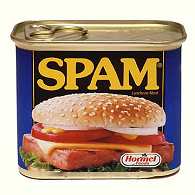
|
|
|
|
Weird and Wonderful Web Words Spam It's starting to feel like everything is spam. (By the way, thanks for not treating this newsletter as spam.) Even more interestingly, the trademark holders for SPAM® at Hormel Foods are having fits over the Internet co-opting their word. I found an article by Tim Jones of the Chicago Tribune, which was posted online on July 30, 2003. In it he has some interesting facts about Hormel Foods' battle for keeping SPAM® from being pulled down by spam. "They [owners of SpamArrest LLC] are saying because spam is a term for e-mail that they can take it and trademark it. What they're doing is stealing some of our equity," said Kevin Jones, assistant secretary and senior attorney for Hormel, which is headquartered in Austin. "We coined the term 66 years ago ... and we stand behind the reputation of that word." "It's one thing to have a slang term. It's another to commercially exploit it," Jones said. The Chicago Tribune goes on to give us more interesting background: But the fight over spam adds a new twist because the reputation of the word is not simply linked to the 6 billion cans of meat that have been sold since 1937 or the Monty Python comedy skit that many, including Hormel, believe gave birth to the term for junk e-mail. The use of the term is rapidly gaining prominence in the public arena and the notoriety of spam has prompted more than 30 states to enact laws intended to stem the tide of unwanted and often pornographic e-mail messages. All Hormel wants to avoid is having people think that they named their product after junk e-mail. Who would have thought that unsolicited commercial email would not only be such a big problem, but it would also be so complicated to name? Have a term you want explained? Email Robert@quokkasystems.com |

|
|